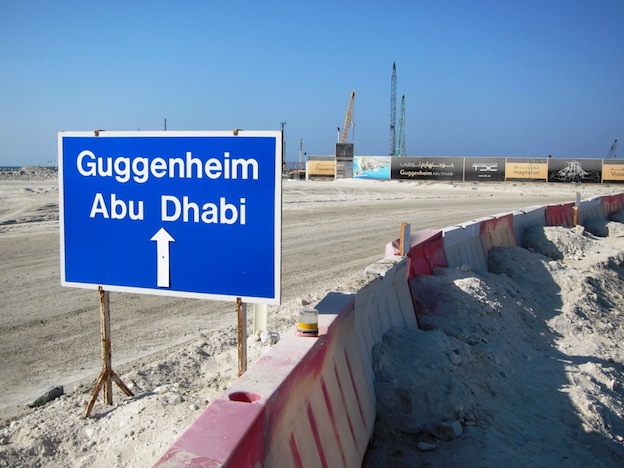GulfLabor calls on Guggenheim to respond to the PwC Report, and to all cultural institutions, including Louvre Abu Dhabi, to publicly announce steps to resolve labor rights issues on their sites.
DOWNLOAD as PDF: GulfLabor_Public Statement_1.7.13
Gulflabor ((https://gulflabour.org)) is a coalition of artists, writers, curators, educators and others working to ensure that workers’ rights are protected during the construction and maintenance of new cultural institutions on Saadiyat Island in Abu Dhabi. Our work was initiated in response to a Human Rights Watch report ((2009 report: http://www.hrw.org/reports/2009/05/18/island-happiness-0; 2012 follow-up report: http://www.hrw.org/reports/2012/03/21/island-happiness-revisited-0)) on labor conditions on Saadiyat Island.
In 2010, and after months of inconclusive conversations with the Guggenheim Foundation in New York, Gulflabor initiated an artist boycott ((http://www.ipetitions.com/petition/gulflabor/)) of the Guggenheim Abu Dhabi.
In 2011, Gulflabor’s actions eventually led Abu Dhabi’s Tourism, Development & Investment Company (TDIC) to appoint PricewaterhouseCoopers (PwC) as monitor. ((http://www.tdic.ae/en/news/media-center/news/tdic-to-appoint-pwc-to-monitor-saadiyat-island-contractors-performance-in-the-area-of-worker-welfare.html))
In September 2012, PwC published its first annual monitoring report. ((http://www.tdic.ae/en/article/property-1/the-epps-2012-annual-independent-monitoring-report.html))
Gulflabor reviewed this report and issued a public response. ((https://gulflabour.org/wp-content/uploads/2012/11/gulflabor_updateresponsetopwc_nov_2012.pdf))
Today, Gulflabor calls on all academic and cultural institutions building on Saadiyat Island to seek uniform and enforceable human rights protections for the workers working on their sites. ((In 2011 and 2012, between 10,000 and 19,000 migrants worked on Saadiyat Island. Their numbers are expected to increase in the next building phase. See PwC report page 10.)) These protections should specifically address:
1. Recruitment fees and relocation costs paid by workers.
2. Poor and unsafe housing and living conditions, even in the Saadiyat Construction Village that is meant to embody the highest standards for worker welfare upheld by TDIC. ((http://www.tdic.ae/en/article/property-1/saadiyat-island-construction-village.html))
3. Lack of freedom to form trade unions for collective bargaining or to change jobs.
4. Lack of open platforms for workers to express grievances or abuses without fear of recrimination or dismissal.
We urge the Guggenheim Foundation to publicly respond to PwC’s report, and we continue to call on all parties in the region to publicly commit themselves to the welfare and fair working conditions of those who will be constructing these cultural institutions.
In our consultations with the Guggenheim Foundation, we have highlighted the “Dhaka Principles,” devised by the Institute for Human Rights and Business ((http://www.dhaka-principles.org)) as a potential source for realistic guidelines that abide by internationally recognized standards of human rights.
Given the Guggenheim Foundation’s global program (particularly its recently launched Guggenheim UBS Global Map Art initiative ((http://www.guggenheim.org/guggenheim-foundation/collaborations/map)) which is currently focused on contemporary art from South and Southeast Asia) and its own stated goals “to bring together artists, curators, and supporters of the arts across geographic boundaries to engage more deeply in the exponential expansion of the art world,” Gulflabor encourages the Guggenheim to take a leading role along with its future neighbors in Abu Dhabi (Louvre Abu Dhabi, Zayed National Museum ((The Zayed National Museum is developed with the advice and counsel of the British Museum.)), New York University Abu Dhabi, among others) in promoting the introduction and observance of international standards of labor and human rights for all workers on Saadiyat Island. ((For more information on cultural institutions on Saadiyat Island, see: http://www.saadiyatculturaldistrict.ae/en/saadiyat-cultural-district/partners/))
Sincerely,
Gulflabor Working Group:
Haig Aivazian, Ayreen Anastas, Doug Ashford, Shaina Anand, Doris Bittar, Tania Brugera, Sam Durant, Rene Gabri, Mariam Ghani, Hans Haacke, Brian Holmes, Rana Jaleel, Guy Mannes-Abbott, Naeem Mohaiemen, Walid Raad, Michael Rakowitz, Andrew Ross, Ashok Sukumaran, Gregory Sholette, Beth Stryker, Murtaza Vali.
[footnotes]
Previously:
November, 2012: GulfLabor responds to Price Waterhouse Coopers report
September 24, 2012: Price Waterhouse Coopers releases monitoring report
September 15, 2011: Gulflabor responds to Price Waterhouse Coopers appointment.
Dear all,
We are writing this note to let you know that the boycott of the Guggenheim Abu Dhabi that we initiated in March 2011 remains in place.
Our work on this has already led to concrete results with the appointment in June 2011 of PricewaterhouseCoopers (PwC) as monitor to supervise labor standards on Saadiyat Island. This, for us, is a step in the right direction provided that PwC develops and implements a transparent and rigorous monitoring program; works with one of the Human Rights Watch recommended independent monitors to develop their monitoring program and that PwC does not have a conflict of interest with other companies or governmental entities in Abu Dhabi. We have made three requests to the Guggenheim about these matters. The Guggenheim has answered that they have not received updates on this from the Tourism & Development Investment Company (TDIC).
With this note we wish to affirm that the boycott remains in place and that Gulflabor Coalition members continue to meet regularly in New York, and that the Coalition remains in contact with the Guggenheim, TDIC, and Human Rights Watch in order to find adequate solutions to labor standards in Abu Dhabi’s Saadiyat Island.
Sincerely,
Gulflabor

One thought on “7 Jan 2013: GulfLabor Public Statement”
Comments are closed.